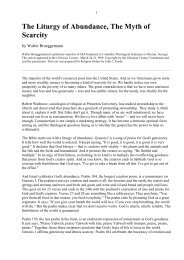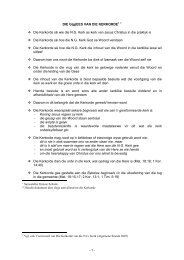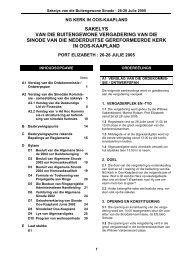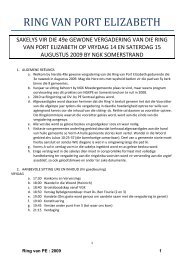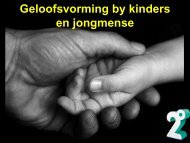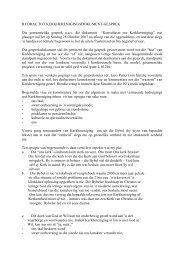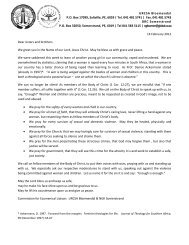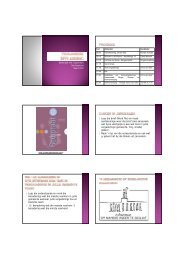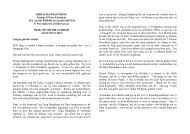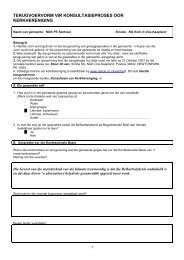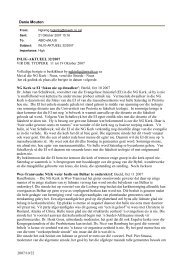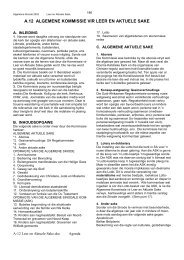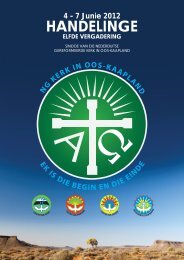You also want an ePaper? Increase the reach of your titles
YUMPU automatically turns print PDFs into web optimized ePapers that Google loves.
2000 years of church history; key turn<strong>in</strong>g po<strong>in</strong>ts and def<strong>in</strong><strong>in</strong>g moments; development and growth of<br />
Christianity <strong>in</strong> South Africa and other African countries; history of DRC family , especially the URCSA;<br />
3.6 Practical theology<br />
Theoretical aspects of: preach<strong>in</strong>g; Christian education/catechism; youth m<strong>in</strong>istry; liturgics; pastoral care and<br />
counsell<strong>in</strong>g; funerals and bereavement; church organisation or management; Christian leadership; small<br />
group work (cell groups, etc.); leadership development;<br />
3.7 Missiology, <strong>in</strong>tercultural theology, ecumenism<br />
Contextual Christian witness; Theology of holistic mission; theology of <strong>in</strong>terreligious encounter; theology of<br />
<strong>in</strong>tercultural communication; racism and reconciliation/liberation; ecumenical cooperation and network<strong>in</strong>g;<br />
3.8 Church polity ( kerkreg )<br />
Theological <strong>in</strong>sights underly<strong>in</strong>g a presybyterial system of church governance; types of church governance<br />
(episcopal, <strong>in</strong>dependentist, presbyterial) and the history of each type; Church Order of the URCSA;<br />
3.9 Other discipl<strong>in</strong>es (electives)<br />
An <strong>in</strong>ter-discipl<strong>in</strong>ary approach; will<strong>in</strong>gness and ability to use <strong>in</strong>sights from other sciences:<br />
History (South African politics, economics, cultures, communities);<br />
Religious Studies (faith of other religious communities; <strong>in</strong>digenous knowledge systems);<br />
Political Science (Democracy; African Renaissance; NEPAD);<br />
HIV/Aids pandemic (Prevention; Pre-test & post-test counsell<strong>in</strong>g; Home-based care; De-stigmatis<strong>in</strong>g <strong>in</strong><br />
congregations and communities);<br />
Development studies (human-centred development, poverty alleviation, susta<strong>in</strong>able livelihood framework);<br />
Psychology (counsell<strong>in</strong>g skills, developmental psychology; gender identities; )<br />
L<strong>in</strong>guistics (simultaneous <strong>in</strong>terpretation; multi-l<strong>in</strong>gualism)<br />
English (good vocabulary and grammar, documentation and record keep<strong>in</strong>g)<br />
First language (good vocabulary and grammar)<br />
An(other) African language (basic communication skills)<br />
Sociology (social dynamics <strong>in</strong> families and communities; urbanisation; crime and crime prevention);<br />
Law (human rights discourse; labour relations; marriage law; mediation, arbitration, conflict resolution)<br />
Accountancy (basic bookkeep<strong>in</strong>g, <strong>in</strong>terpretation of f<strong>in</strong>ancial statements)<br />
Economics (entrepreneurship)<br />
3.10 Global context<br />
Globalisation and its impact;<br />
3.11 General knowledge<br />
Good general knowledge of South African life and culture, <strong>in</strong>clud<strong>in</strong>g sport, enterta<strong>in</strong>ment, politics, history,<br />
literature.<br />
4 Skills<br />
The skills identified <strong>in</strong> the process can be categorised <strong>in</strong> the follow<strong>in</strong>g way:<br />
4.1 Communication skills<br />
4.1.1 Proclaim<strong>in</strong>g: Apply<strong>in</strong>g the Bible contextually; expla<strong>in</strong><strong>in</strong>g the Bible to others; Preach<strong>in</strong>g; Persuad<strong>in</strong>g<br />
people; mak<strong>in</strong>g eye contact; credible communication; Communicat<strong>in</strong>g well <strong>in</strong> context; Intercultural<br />
communication skills; Interest <strong>in</strong> well-be<strong>in</strong>g of congregation shar<strong>in</strong>g <strong>in</strong> people s joys and sorrows;<br />
Communicate with young people good listener; Conduct<strong>in</strong>g funerals; Language abilities; Conduct<strong>in</strong>g<br />
services; ability to <strong>in</strong>terpret from/to different languages;<br />
4.1.2 Teach<strong>in</strong>g: Sunday school, catechism and group Bible study;<br />
4.1.3 Writ<strong>in</strong>g: Communicate on paper prepare reports, agendas, m<strong>in</strong>utes, correspondence; computer<br />
literacy; draw up a newsletter;<br />
4.2 Interpretation (hermeneutical) and <strong>in</strong>tellectual skills<br />
Critical read<strong>in</strong>g and understand<strong>in</strong>g of the Bible <strong>in</strong> context; Critical th<strong>in</strong>k<strong>in</strong>g and evaluation; Read<strong>in</strong>g = life<br />
long learn<strong>in</strong>g; Cont<strong>in</strong>ue updat<strong>in</strong>g of knowledge and skills to be contextual;<br />
4.3 Spirituality (Word and Spirit)<br />
Listen<strong>in</strong>g to God (meditation); Prayer; Spiritual self-preparation (not only sermons); Spiritual leadership;<br />
Spiritual tra<strong>in</strong><strong>in</strong>g of congregation; Personal and moral formation; Quality leadership; Character build<strong>in</strong>g;<br />
Creativity; Discern<strong>in</strong>g; Resistance to pressure.<br />
4.4 Management/leadership<br />
4.4.1 Abilities to lead; Spiritual leadership; Visionary leadership; Team leader/mobilis<strong>in</strong>g a team; Goal<br />
sett<strong>in</strong>g, motivation; Strategic plann<strong>in</strong>g; Direct<strong>in</strong>g people to their goal; Ability to comb<strong>in</strong>e different functions <strong>in</strong><br />
a congregation (pastor, leader, manager, preacher, counsellor, etc.); Meet<strong>in</strong>g procedure; Organis<strong>in</strong>g and<br />
lead<strong>in</strong>g meet<strong>in</strong>gs; Facilitation; Group dynamics; Empowerment and delegation; Team worker/ good work<strong>in</strong>g<br />
relationships; Network<strong>in</strong>g with other m<strong>in</strong>isters/colleagues; Skilful <strong>in</strong> manag<strong>in</strong>g diversity and complexity;<br />
Be<strong>in</strong>g neutral with regard to diversity <strong>in</strong> a congregation and community; Persuasion; Negotiation; Listen<strong>in</strong>g<br />
to people/community; Relate well to people also language-wise; Listen<strong>in</strong>g to what people say and don t<br />
say; Look with open eyes; Observ<strong>in</strong>g non-verbal signs (whole situation); Resistance to pressure;<br />
ÌÏÁ



